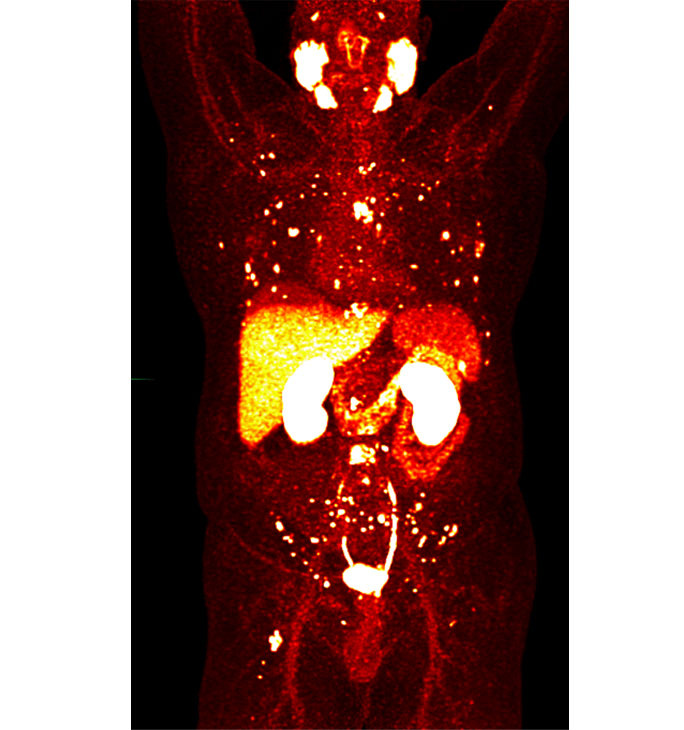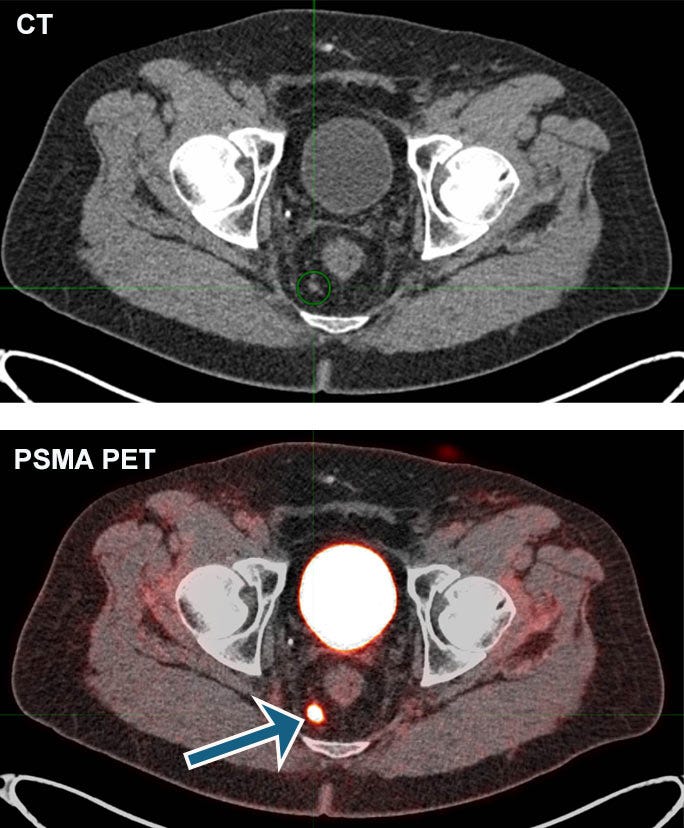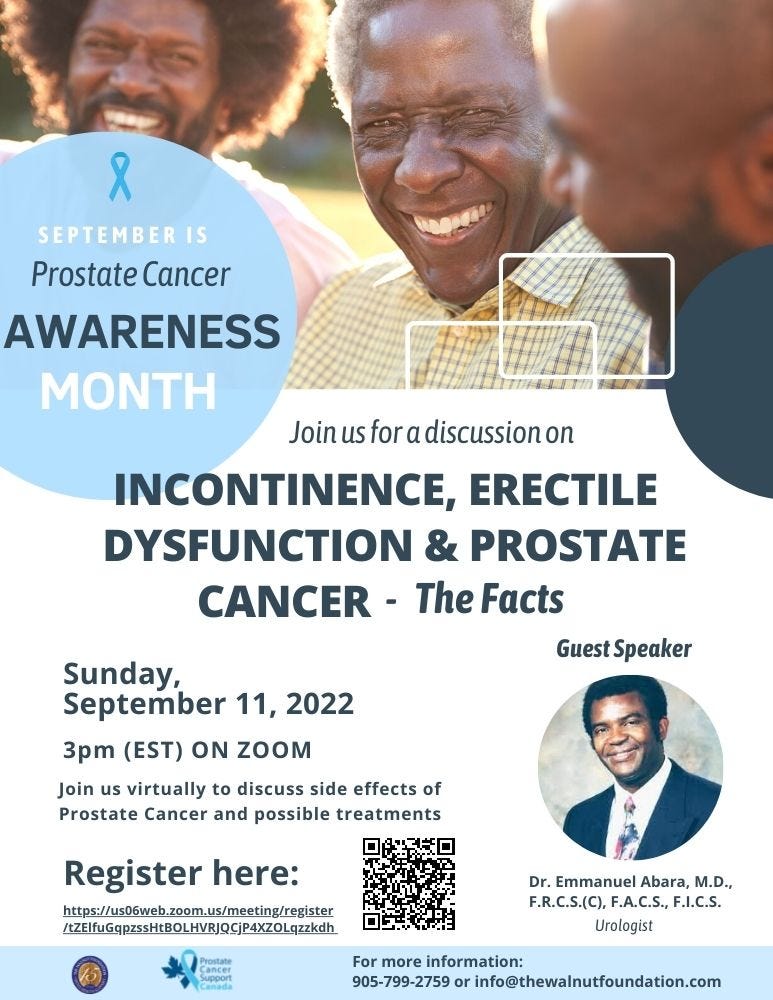By Howard Wolinsky
I first heard of PSMA-PET imaging at a scientific conference a few years ago at McCormick Place in Chicago. I was covering the meeting for an online publication, and I didn’t apply the Australian speaker’s presentation to myself as a patient with low-risk prostate cancer.
PSMA-PET is no longer obscure. Increasing numbers of men with advanced cancers are undergoing PSMA.
Does it have a role in monitoring men on active surveillance for low-risk Gleason 6 prostate lesions?
Spoiler alert: Not yet for AS for low-risk for low-risk patients. In Australia, PSMA-PET is used to stage intermediate (Gleason 7) prostate cancers as well as more advanced prostate cancers.
What are PSMA-PET scans: PET scans use a radioactive dye to light up specific regions in the body. PSMA-PET scans look for areas where the PSMA protein is found, showing the presence of prostate cancer cells. PSMA stands for prostate-specific membrane antigen - a protein found on the surface of prostate cancer cells. Gallium-68 refers to the radioactive part of the PET scan.
The Aussies were ahead of the U.S. with PSMA.
(PSMA-PET scan shows cancer “hot spots” at University of Chicago.)
The Food and Drug Administration in December 2020 approved Gallium 68 PSMA-11 (Ga 68 PSMA-11) – the first drug for PET imaging of PSMA-positive lesions in men with prostate cancer. Initially, PSMA, a radioactive IV diagnostic agent, is aimed at men with suspected metastatic cancer, who are potentially curable by surgery or radiation therapy. Ga 68 PSMA-11 is also indicated for patients with suspected prostate cancer recurrence based on elevated serum prostate-specific antigen (PSA) levels.
The technique also has the potential to be used to target and kill prostate cancer cells.
But what are the implications for men with low-risk to favorable intermediate-risk prostate cancer, the active surveillance (AS) crowd?
(Two imaging scans of a man who had a prostatectomy (prostate removal) the year before and was found to have a small, but abnormal rise in PSA level. A follow-up CT scan showed a normal-appearing, 2 mm lymph node (top image). But a PMSA PET scan spotted prostate cancer cells in the tiny node (see arrow in bottom image).
Since this January. Medicare has covered PSMA-PET scans. Insurance may vary.
I also have heard predictions that the day is coming when PSMA will replace Magnetic Resonance Imaging to monitor men on AS.
I wonder if PSMA’s ability to pinpoint even small amounts of prostate cancer could trigger anxiety in some cancerphobic patients.
I contacted Dr. Jeremy Grummet, a leading Australian urologist, for a PSMA-PET imaging update from Down Under.
(Dr. Jeremy Grummet)
He is director of the Clinical Research Urology Unit at Alfred Health, Monash University in Australia and a member of the prostate cancer guidelines panel for the European Association of Urologists.
He noted that though PSMA has been used for a couple of years in Australia, the national health scheme there, Medicare, only as of July 1 covers staging of intermediate and high-grade prostate cancer.
Here’s a quick Q&A on PSMA:
The Active Surveillor: How is PSMA used in Australia?
Dr. Jeremy Grummet: It is as good as MRI at detecting the primary in the prostate as MRI, but is currently reimbursed for staging only (extent of cancer outside the prostate).
TAS: Is PSMA-PET ever used in lieu of MRI?
JG: Only when MRI is contraindicated. But this can be quite often, e.g. hip replacements, coronary stents, pacemakers, claustrophobia
TAS: Is PSMA more useful?
JG: Its advantage is that it stages the whole body. MRI only images the pelvis
TAS: Is it used for AS?
JG: No.
TAS: Do a lot more men end up being diagnosed as having even the tiniest PCa?
JG: No. It’s on a par with MRI in detection rate
TAS: Does that result in more anxiety than the MRI or biopsy approaches?
JG: N/A
Ready for Prostate Cancer Awareness Month?
Don’t miss: ASPI (Active Surveillance Patients International) will be premiering the first of a new video series titled “Active Surveillance 101" at noon Eastern on September 24, 2022.
Register here: https://zoom.us/meeting/register/tJYpdeCspj4qGte3eiqQjNZDKwLpPvMdVlNl
Like 101-level courses in colleges, AS 101 is aimed at teaching the basics. In this case, it's the basics of active surveillance, close monitoring of low- to favorable intermediate-risk prostate cancer.
The program features conversations between actual patients and their partners/spouses and leading experts. The goal of this series is to reach all AS candidates, including those who have not yet been diagnosed with prostate cancer but have rising PSAs (prostate-specific antigen) blood levels and offer them an introduction to AS and help them formulate questions when they go to their family doctors, urologists, or oncologists.
The first episode features a couple, Nancy and Larry White in a simulated office visit with Dr. Steve Spann, a top family physician and dean of the University of Houston College of Medicine. They discuss Larry's rising PSA and what it may mean.
In subsequent episodes, the couple visits Dr. Laurence Klotz, of the University of Toronto, the "father of active surveillance." Other episodes of AS 101 are being developed on biopsies, imaging, and DNA testing.
AS 101 is sponsored by the Active Surveillance Coalition, which includes Active Surveillance Patients International, the AnCan Virtual Support Group for Active Surveillance, Prostate Cancer Support Canada, Prostate Cancer Research Institute, and TheActiveSurveillor.com newsletter. We encourage you to share this series with anyone you know who is dealing with this issue, including your family physician.
The Walnut Foundation Monthly Meeting in support of Prostate Cancer Awareness Month.
Topic:-Incontinence, Erectile Dysfunction & Prostate Cancer with Special Guest. Dr. Emmanuel Abara, Urologist.
This is a free webinar. You may submit your questions in advance to info@thewalnutfoundation.com
The Prostate Cancer Support Canada is holding its 2022 Prostate Cancer Virtual Conference September 17-18 in honor of Awareness Month.
Day 1, The ‘New Normal’ for Support Groups, will focus on facilitation and communication skills for those in, or interested in, leadership roles in the prostate cancer support community.
Day 2, Prostate Cancer Realities will more broadly address issues of interest to our community including managing anxiety and stress throughout the cancer journey, genetics and prostate cancer, upcoming research, how to find trusted information about prostate cancer, and more.
Dr. Brian Goldman, best-selling author and host of White Coat, Black Art on CBC radio, will be speaking about The ‘New Normal’ for Support Groups.
Check for details in the conference program ‘flipbook’ with session + speaker details and registration link: https://bit.ly/2022PCVCprogram
New AS patient blog
Martin Gewirtz, an active surveillance patient and one of the best consumer researchers out there, has just launched a blog: http://asprostatecancer.blog with CancerABCs.
Why not give Martin some love?
He said: “As with all new endeavors, I'm starting small with no bells and whistles, but hope to augment the design as I proceed to post blogs and information which I hope will be helpful to all. … Since it's Prostate Cancer Awareness Month, I hope to churn out at least 3-5 more posts to add to this first introductory post. I have no shortage of topics and opinions (!), but would welcome any suggestions for topics which may be particularly relevant to you.”
He also will be speaking on AS at CancerABCs FREE in-person conference on November 5th in The Villages in Florida.
For more information, go to:
https://www.cancerabcs.org
Prostate Cancer Foundation is looking at physical and mental illness.
For Prostate Cancer Awareness Month, the Prostate Cancer Foundation, the 800-pound private prostate cancer researcher, is holding a webinar on “Physical and Mental Wellness in Prostate Cancer.”
Here are the details:
PCF President and CEO Dr. Charles J. Ryan is hosting a series of webinars.
During Prostate Cancer Awareness Month, PCF challenges everyone to Get Healthy. Ryan and guests will discuss key aspects of nutrition, exercise, and mental health in prostate cancer.
The event will be Sept. 20, 2022 04:30 PM in Pacific Time (US and Canada).
Sign up to join here: https://us06web.zoom.us/webinar/register/WN_UhsH_dPvQgyf2GXadgMyIw
Following each segment, there will be a live Q&A.
• Prostate 8: Simple lifestyle changes that work (Dr. Stacey Kenfield, UCSF)
Dr. Kenfield is Associate Professor in the Department of Urology and is the Helen Diller Family Professor of Population Science for Urologic Cancer. She is an expert on lifestyle, exercise, nutrition, and their impact on prostate cancer. She'll discuss research showing how specific lifestyle factors improve outcomes after prostate cancer diagnosis, and practical ways to incorporate these changes into your life.
• Mental Health and Prostate Cancer (Dr. Andrew Roth, Memorial Sloan Kettering Cancer Center)
Dr. Roth is an Attending Psychiatrist and is board-certified in Psychiatry, Geriatric Psychiatry, and Psychosomatic Medicine. He is focused on caring for the mental health needs of patients with prostate cancer and other genitourinary diseases. He'll provide an overview of the challenges patients commonly face, as well as strategies and resources for coping and living well during treatment and survivorship.
Here’s hoping Dr. Roth will cover AS as well as advanced prostate cancer.
Please send any questions for the speakers in advance to: webinar@pcf.org







Indeed, a topic worth staying on top of the AS question pile. Thanks, Howard, for reaching out to Jeremy Grummet, an excellent resource aside from being a generous mensch!
And thank you for your gracious mention of my new blog. I might call upon you for writing tips! 😃
Best of luck, Martin. With the blog et al. My tip for the day? Buy low; sell high. Howard